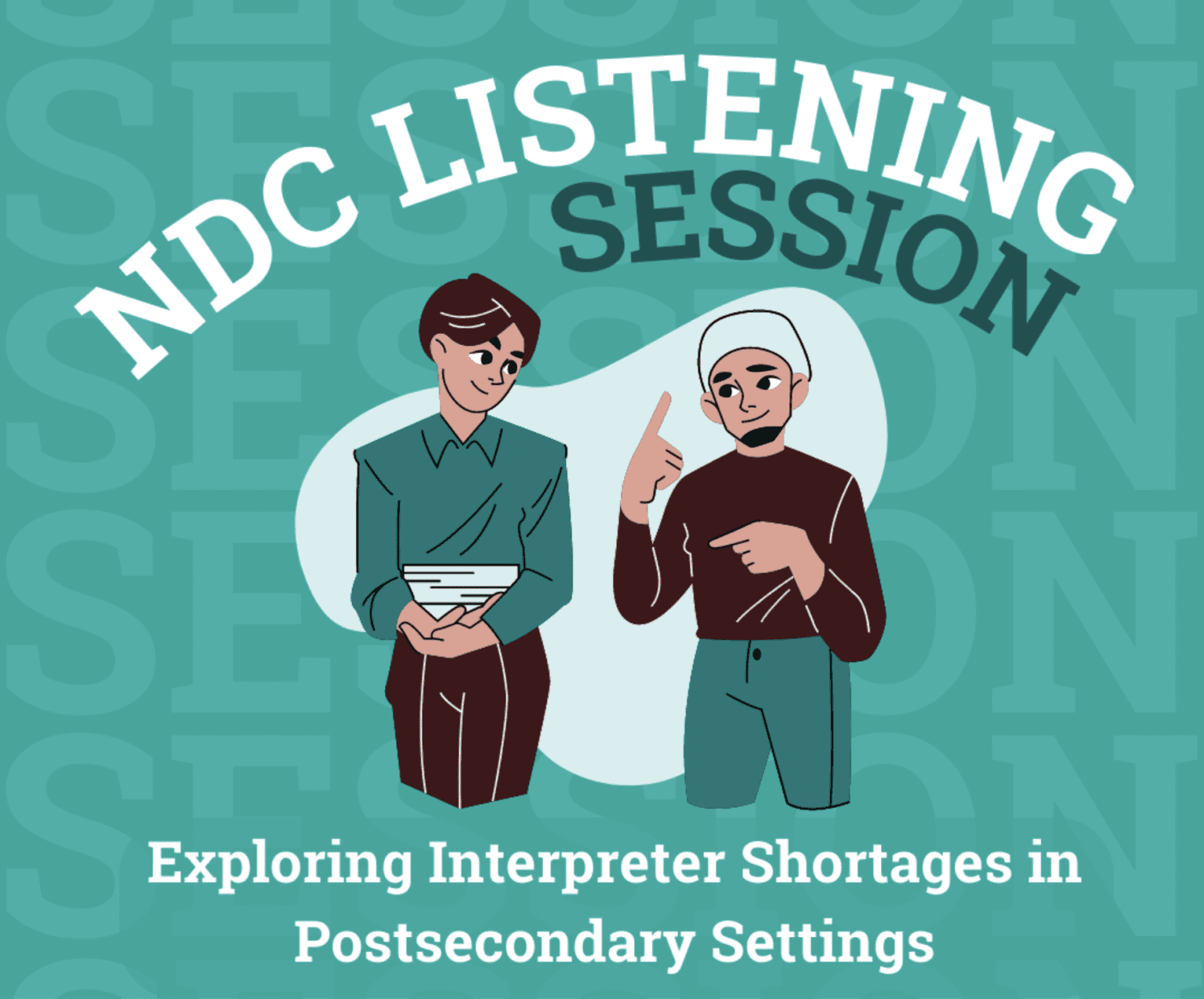In response to the continued effects of the interpreter shortage, NDC has remained focused on creating opportunities for disability services professionals to connect both with us and with one another as they continue to provide support services to deaf students. On March 30, 2023, NDC hosted a second session of Exploring Interpreter Shortages in Postsecondary Settings Listening Session, wherein participants discussed a variety of potential solutions.
Trending Shortage Reviewed
NDC reshared trending conversations happening across the country at colleges that are experiencing shortages with sign language interpreting services. Data collected from disability services professionals revealed that many institutions are resorting to less than ideal practices in order to provide access for students. Currently, the most pressing challenges institutions are experiencing include: (1) recruiting and/or retaining interpreters (2) inability to secure interpreters for in person activities, and (3) provide teams of interpreters. As a result, coordinators are unable to offer the depth and breadth of services they desire. Rather, they must resort to hiring who is available at the moment—including agency interpreters that often incur higher costs and fees.
At the center of the shortage are students.
Inadequate and inconsistent services can result in students missing information, receiving misinformation, and being unable to engage in learning alongside their peers. Interpreting shortages are generating additional barriers and burdens for deaf students. As a result of these subpar services, students must seek additional clarification, tutoring, or support from instructors, which also requires interpreting services. Ultimately, such conditions negatively impact students’ abilities to persist and complete their academic programs.
What are colleges doing about the shortage?
The shortage in interpreting services is intensifying existing inequities for deaf students at institutions across the country. This listening session was an opportunity to shift the conversation towards practical solutions. In breakout sessions, participants were able to connect and share strategies for increasing payment and offering perks, creative scheduling solutions, and explore opportunities to grow their own pool of interpreters. Spotlighted colleges shared strategies including:
- Offering:
- pay increases
- paid advanced internships for recent graduates, specifically BIPOC interpreters.
- “block” scheduling for interpreters and utilizing “on call” interpreters to cover unexpected or unpredicted requests
- consistent hours, paid parking, and paid prep time
- remote workspaces for interpreters as an office for downtime, prep or to capture work opportunities between on-campus assignments
- Employing hybrid interpreting teams – one live in the classroom, and one virtual on zoom
- Fostering relationships with new interpreters by:
- partnering with Interpreter Preparation Programs at other colleges to recruit new interpreters with internships and mentoring opportunities on campus.
- pairing early career interpreters with experienced teams to grow and strengthen the pool of providers
How will NDC help?
We are grateful for the willingness of the community to come together in a productive dialogue about this urgent issue. Participant reports and the strategies exchanged were not only valuable in offering colleagues ideas for addressing immediate needs, but the dialog also provided context and confirmation of larger systemic issues that must be addressed.
Whether institutions have a steady enrollment of students or perhaps enrollment fluctuations, systems—policies, practices, relationships, resources, and supportive mindsets—must be in alignment to ensure that deaf students have the same access to all programs and services at their institutions as their peers. Short-term solutions may help institutions meet their legal obligations under the ADA, yet they are not providing fair experiences for deaf students. It’s time for a change in practice and a commitment to access for deaf students.
NDC is here to get your institution started.
- Look for “Strategy Spotlights”– NDC will interview, document, and share details on existing strategies effectively implemented at postsecondary institutions. The goal is to provide guidance on how to replicate the success at your institution. Is your institution ready for a spotlight? Contact us – help@nationaldeafcenter.org.
- Participate in data collection – NDC now has three surveys currently open and actively collecting input about postsecondary experiences for deaf students.
- Student Survey: 2022-2023 DPAIS is designed for students to capture their experiences. This is an opportunity for students to share how college experiences for deaf students can be improved. Share this link with your students. It takes only 15 minutes, and their input matters! If you have more than 10 responses from your institution NDC can create a customized report upon request.
- Interpreter Shortage Survey: Exploring the Interpreter Shortage in Postsecondary Settings is designed for sign language interpreters working in postsecondary settings, college students using interpreting services, and interpreting schedulers/coordinators responsible for managing postsecondary interpreting services. This is an opportunity for NDC to further explore the trending shortage and disseminate information to help institutions.
- Disability Service Provider Survey: Coordinating Disability Services for Deaf Students in Postsecondary Settings is designed for disability services providers or deaf services managing services for deaf students. We invite you to share your experiences so we may update our previous findings and help NDC identify additional areas that need to be strengthened to facilitate success for deaf students.
- Explore more about changing practices – Explore our new online modules to further explore existing barriers at your institution and what steps you can take to make changes.









